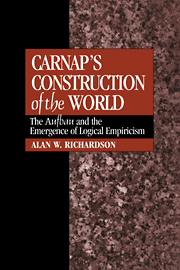Book contents
- Frontmatter
- Contents
- Acknowledgments
- Introduction
- 1 Reconstructing the Aufbau
- 2 The problem of objectivity: An overview of Carnap's constitutional project
- 3 An outline of the constitutional projects for objectivity
- 4 The background to early Carnap: Themes from Kant
- 5 The fundamentals of neo-Kantian epistemology
- 6 Carnap's neo-Kantian origins: Der Raum
- 7 Critical conventionalism
- 8 Epistemology between logic and science: The essential tension
- 9 After objectivity: Logical empiricism as philosophy of science
- Bibliography
- Index
2 - The problem of objectivity: An overview of Carnap's constitutional project
Published online by Cambridge University Press: 30 October 2009
- Frontmatter
- Contents
- Acknowledgments
- Introduction
- 1 Reconstructing the Aufbau
- 2 The problem of objectivity: An overview of Carnap's constitutional project
- 3 An outline of the constitutional projects for objectivity
- 4 The background to early Carnap: Themes from Kant
- 5 The fundamentals of neo-Kantian epistemology
- 6 Carnap's neo-Kantian origins: Der Raum
- 7 Critical conventionalism
- 8 Epistemology between logic and science: The essential tension
- 9 After objectivity: Logical empiricism as philosophy of science
- Bibliography
- Index
Summary
in this chapter we shall examine more closely the epistemological problem of the constitutional system of the Der logische Aufbau der Welt, as well as some of the technical means that Carnap proposes to use to solve this problem. Our first order of business will be to examine the import of the epistemological vocabulary used to motivate the projects of the work. This vocabulary emphasizes the subjective-objective distinction. It is incumbent upon us, then, to try to acquire a better sense of Carnap's use of these terms. Most particularly, we must try to understand what is at stake in the claim that structure yields objectivity.
The main purpose of this chapter is to present Carnap's major motivating ideas as an introduction to his thought on objectivity. In Chapter Three, we shall examine his particular solutions to the problem of objectivity in the Aufbau. The point is to emphasize the crucial interpretative issues raised by the work on their own terms, while freeing ourselves from the need to cram their significance into ready-made philosophical pigeonholes. The puzzles that we will be left with at the end of these chapters and the question of how they arise within the philosophical context of Carnap's book will be our major concern in the remainder of the book.
KNOWLEDGE VERSUS EXPERIENCE: THE PROBLEM OF SUBJECTIVE ORIGINS
Let us recall the form of the epistemological problem that Carnap presents at the opening of his book: Knowledge, for any given agent, begins in the stream of experience of that individual.
Information
- Type
- Chapter
- Information
- Carnap's Construction of the WorldThe Aufbau and the Emergence of Logical Empiricism, pp. 31 - 64Publisher: Cambridge University PressPrint publication year: 1997
